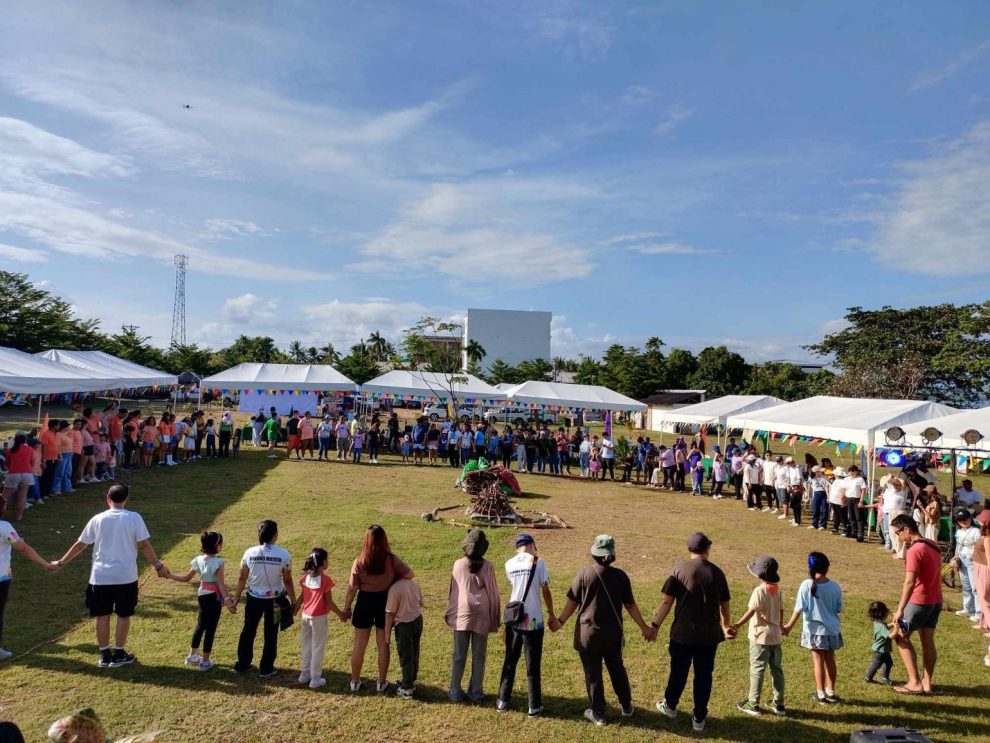CEBU CITY—The Children’s Paradise Montessori (CPMS) kicked off its 20th anniversary this year with a Family Camp Out at LaVie Resort in Liloan, Cebu on February 1 with almost 300 participants composed of children, parents, and teachers gamely adapting well to be more creative, spontaneous, and independent, highlighting the importance of recognizing children for their values and character rather than just their academic achievements.

“This Family Camp communicates the significant growth of CPMS from 13 children to around 200 today. The presence of graduates and alumni, including teachers marked the generational impact that CPMS brings to these families,” CPMS president, Marivic Bathan in an interview with this writer.
Bathan shared how her niece’s journey inspired her shift from corporate to education, leading to the founding of a Montessori-based inclusive school. After years of doubt, she found validation and relief, knowing she made the right choice—especially as her niece is now set to become a professional teacher despite her challenges.


According to Bathan, the Family Camp activities included family games, arts, workshops, breakout sessions and other evening activities including a bonfire, s’mores, and a symbolic lighting ritual involving “One-Fire”. These activities are collaboratively facilitated by a team of long time CPMS consultants and guardians that included Fr. Loreto Jaque, Coah May Soriano, Coach Mark Saballa (founder of Coaching Space), Teresa Ruelas (founder of Cebu Farmers Market), and Rosebelle Daculan with the teachers and alumni students.
Bathan and Soriano recalled some of the notable memories from the two decades of impactful education and the CPMS journey, achievements, and commitment to holistic Montessori education.
“Children are not miniature adults; they are our teachers, showing us the essence of life—joy, wonder, and unconditional love. At CPMS, we honor the divine nature of every child, creating an environment where they are heard, respected, and supported to thrive. This is why the school remains a beacon of hope and a true paradise for children,” Fr. Jaque said while he guided families in a joyful workshop.


In celebration of its 20th year, CPMS has lined up activities that aim to promote growth, creativity, and community engagement starting with the CPMS Family Camp, Best Buddies Friendship Walk on March 29, a Teacher’s Appreciation Week in April, a CPMS Recital in May, and in September a much-awaited Children’s Summit: Where Innovation Meets Purpose and the Child Shapes the Future as its theme.
Part of the 20th year anniversary is to launch the Vivencia Foundation that is dedicated to advancing educational innovation and expanding access to Montessori as a way of life. CPMS will also participate in the 1st Asian Montessori Model United Nations (MMUN) in Thailand, offering students a unique opportunity to engage in global problem-solving and diplomacy, Bathan said.
Bathan mentioned that the integration of scouting activities and the excitement of the children, with some staying overnight and others returning the next day outlined the values of CPMS which are inclusion, creativity, respect, excellence, authenticity, teamwork, and empowerment or I-C.R.E.A.T.E.
Validation and holistic approach of CPMS

In a media interview at the camp site, Coach May Soriano emphasized on the holistic approach of CPMS–caring for children, parents, and teachers that have been validated by them. She expressed pride in CPMS as the first ever strengths-based school in the Philippines.
Bathan envisions CPMS as a model for innovative educational solutions, laying a strong foundation for future generations. Looking ahead 20 years, she emphasizes engagement, excitement, and parental involvement.
Introducing CPMS 2.0, she highlights its focus on innovation, purpose, and the child’s future—empowering students through meaningful experiences that foster connection, family, and community, countering the isolating effects of the digital age.
“The goal of the Family Camp is to solidify the creative intentional learning community that CPMS is becoming. Through genuine connections and shared experiences of the children, parents, consultants, guardians, supporting government agencies, teachers, school personnel, and administrators, we hope that we collectively become the village that builds children for success.,” Bathan said.
CPMS impacts on teachers, students and parents
Donna Carmina Castelo, an academic expert, Dean of College of Arts & Sciences, SWU-PHINMA, and a CPMS parent, emphasized the unique value of CPMS’s educational approach. “Dr. Maria Montessori had it right. This is the best kind of education any child can have. At CPMS, children are guided gently, lovingly, and holistically to reach their fullest potential,” she added.

“We stay true to these principles, and the success stories of our students—many of whom thrive despite challenges—are a testament to the strength of this genuinely child-centered system,” Bathan replied to Castelo’s comment.
Selena Sanchez Guanzon, a 14-year-old grade 10 student reflected on her experiences with CPMS which began when she was one and a half years old and culminated in a significant impact from attending the Australian International Music Festival at age seven, where she performed at the Sydney Opera House.
This experience boosted her confidence on stage, she said. Transitioning from Montessori to traditional schooling was challenging, but CPMS’ teachings helped her adapt and excel academically, achieving a general average of 90 percent and improving to 95 percent in the first semester of her current year.
“My involvement in writing and journalism fostered by CPMS, has continued into my high school activities. The educational materials and teachings from CPMS facilitated my transition to high school, despite initial challenges. I attribute my current success in campus journalism to the foundational skills I developed through CPMS’ writing activities,” Selena said.
She also mentioned that the added challenge of the first year was being online, which made the transition even more challenging but despite these challenges, Selena managed to pass her classes and maintain good grades, even earning a silver award in grade eight and grade nine.
Selena recalled her involvement in the CPMS newsletter called “Paradeisos” during her elementary years, which allowed her to start her journey in journalism. Currently, Selena is actively participating in her school’s newsletter, where she holds a leadership role in one of the categories.
Conversations with Teachers Isol and Steph
Dr. Stephanie Olano and Dr. Maria Isolde Tanjay taught at CPMS before they transitioned to their current careers now and the conversation always revolved around the experiences of teachers at a Montessori school, highlighting the benefits of the Montessori approach.
Olano underscored the importance of creating a conducive environment for children to learn naturally and noted on the joy of seeing children’s progress, the fun and practical nature of Montessori materials, and the positive impact of field trips on students’ future aspirations.
They noted that Montessori education follows the child’s interests, making learning enjoyable and facilitating a smooth transition to traditional schools, where Montessori graduates often excel academically.

Both Olano and Tanjay described the Montessori environment as a blend of play and learning, where children use materials to learn and they particularly enjoyed the math materials, which made learning fun and engaging for the children.
Tanjay shared the excitement of a field trip to Negros which was a very memorable experience for both children and parents while Teacher Steph highlighted the importance of giving children opportunities to explore their interests, as seen in a graduate who pursued communications due to a field trip experience.
“Such exposure and experiences help children discover their passions and career paths early on. Montessori education follows the child’s interests, guiding them in their learning journey,” Dr. Steph said.
Tanjay noted that while transitioning to traditional schools can be challenging, Montessori students eventually adjust well. She mentioned that Montessori graduates often excel in traditional schools, becoming honor students.

The conversation concluded with a sense of pride in the success of Montessori graduates in various educational settings noting the positive impact of the Children’s Paradise Montessori School (CPMS) in the lives of the teachers, students and parents with “TATAK CPMS” becoming the signature brand of the school towards inclusive education and life-long learning.












